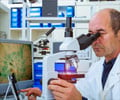In a new research, scientists at Washington University School of Medicine have uncovered why people suffering from a childhood tumor syndrome are shorter than their peers.
Scientists at Washington University School of Medicine have identified the reason why people suffering from a childhood tumor syndrome are shorter than their peers.
The research team has discovered that a mutation that causes neurofibromatosis type 1, also impairs growth hormone secretion.Neurofibromatosis type 1 is caused by a mutation in the neurofibromin 1 (NF1) gene and is characterized by an increased risk of cancer.
"We've learned that the NF1 gene affects stature through a different pathway than the one we've previously focused on to understand cancers in patients with neurofibromatosis type 1," said Washington University neurologist David H. Gutmann, M.D., Ph.D., a Washington University neurologist who treats individuals with neurofibromatosis at St. Louis Children's Hospital.
"Given that this second pathway has been linked to cancer in other contexts, we may need to consider the possibility that it is contributing to these tumors and alter our treatment goals accordingly," he added.
Normally, the NF1 protein, called neurofibromin deactivates RAS proteins. It is believed that in its absence, unchecked RAS can promote cancer development.
For the study, the researchers created a line of mice in which stem cells in the brain do not make the NF1 protein. They found that these mice were significantly smaller than normal and failed to grow and gain weight after birth.
Advertisement
Hegedus also found that the amount of a second hormone that triggers growth hormone release was also greatly reduced.
Advertisement
NF1 also increases brain levels of cyclic AMP (cAMP), an important signaling molecule.
Working with the same line of mice where stem cells in the brain do not make the NF1 protein, researchers fed pregnant mice and their newborns an agent that increased cAMP levels. The baby mice were closer to normal size, even though they still lacked neurofibromin in brain stem cells.
The researchers suspected that the mice didn't completely return to normal because dietary supplementation of cAMP levels cannot match the natural ability of neurofibromin to control cAMP levels.
"What we've learned also may help us gain insight into other disease processes. There are a number of other rare genetic abnormalities that cause short stature, and this same pathway may be involved," said Gutmann.
Now the researchers are planning additional studies to explore the role of the NF1 gene in the pituitary gland and the hypothalamus, a brain region that controls pituitary gland production of growth hormone.
The results of the study appear online in the journal Human Molecular Genetics.
Source-ANI
RAS/L









